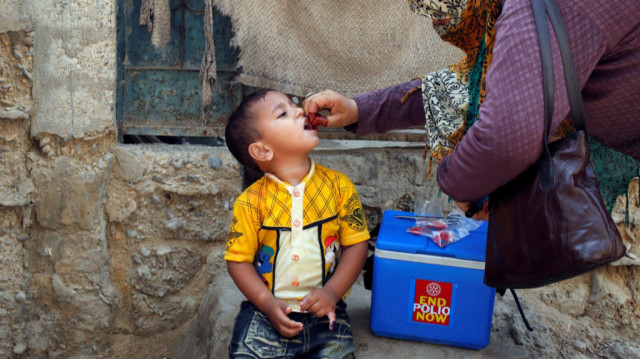
Pakistan has reported at least 19 polio cases this year, following a total of 74 in 2024, which marked a steep jump from just 6 in 2023
Despite more than three decades of sustained efforts and billions invested in mass vaccination drives, training, logistics and awareness, Pakistan remains one of only two countries where the wild poliovirus still circulates, with the other being neighboring Afghanistan.
According to Pakistan’s Polio Eradication Program, the country reported 74 cases of wild polio in 2024, a steep rise from just six in 2023.
This year, at least 19 cases have been confirmed. Environmental surveillance also detected the virus in sewage samples across 20 districts, suggesting ongoing transmission even in places without confirmed infections.
Experts say this resurgence reflects the complexity of polio eradication in Pakistan, where longstanding issues – including mistrust, misinformation, militant violence and operational fatigue – continue to undermine hard-won gains.
So far this year, cases have been reported in 13 districts. These include Dera Ismail Khan, Torghar, Bannu, Lakki Marwat, Tank, and North Waziristan in Khyber Pakhtunkhwa province near the Afghan border; Badin, Larkana, Qambar and Thatta in Sindh; Mandi Bahauddin in Punjab; and Diamer in Gilgit-Baltistan.
These regions include both conflict-affected areas and districts where public service gaps have fueled skepticism toward government-led initiatives.
The ups and downs have been consistent. In 2020, Pakistan recorded 84 cases of wild polio, which dropped dramatically to one case in 2021. But the virus rebounded in 2022 with 20 cases, a reminder that polio can re-emerge quickly in the absence of consistent coverage.
Polio is a highly contagious viral disease that primarily affects children under five. It attacks the nervous system and can lead to permanent paralysis or death. While there is no cure, oral polio vaccines have proven to be an effective safeguard, helping eliminate the virus from most of the world.
- Why does polio still exist in Pakistan?
Pakistan has been working to eliminate polio since 1994, and there has been a significant drop in cases since then. However, its eradication remains elusive.
“Polio has been eradicated in most countries, including our neighbor India, through effective campaigns. But we lag behind due to a combination of security challenges and poor community engagement,” said Dr. Muhammad Rafiq, program specialist at UNICEF Pakistan and former head of the Health Sector Reforms Unit in Khyber Pakhtunkhwa.
He acknowledged that while militant threats are real, widespread parental refusals – often driven by conspiracy theories – remain a major obstacle. Some rumors claim the vaccine is part of a Western plot to sterilize Muslim children.
In a written response to Anadolu, Pakistan’s Polio Eradication Program pointed to persistent virus transmission in a few chronically missed and high-risk areas. These hotspots, it said, face overlapping factors such as insecurity, community resistance to vaccination, campaign fatigue, and gaps in routine immunization.
In some rural areas, residents have also used the vaccine program as political leverage, refusing vaccination unless the government provides basic services such as roads, gas or electricity.
“This reflects a lack of community ownership,” said Rafiq. “The government must craft an effective communication strategy that makes people see this program as a way to protect their own children, not a favor to demand in exchange for infrastructure.”
The continued presence of the virus has also created travel challenges for Pakistanis. Since 2014, the World Health Organization (WHO) has required travelers from Pakistan to carry a valid polio vaccination certificate, a requirement that still remains in place.
- Security threats to vaccination teams
Polio vaccination teams, especially in high-risk and border areas, routinely face violent attacks. According to officials, nearly 150 people involved in anti-polio efforts have been killed since December 2012.
Last April, two security personnel were shot dead in Mastung, a volatile district in southwestern Pakistan’s Balochistan province, during a nationwide immunization campaign. A month later, gunmen struck again in Nushki, another high-risk district in northwestern Balochistan near the Afghan border, killing one person and injuring another during a vaccination drive.
Militants, particularly in parts of Balochistan and Khyber Pakhtunkhwa, often brand vaccination campaigns as Western conspiracies and have targeted workers, many of whom are women.
“We know we could be attacked at any moment, but we continue to do our duty to protect children,” said Lubna Azam, a frontline polio worker from Bajaur, near the Afghan border.
Azam is among more than 400,000 workers, including 225,000 women, who go door-to-door across Pakistan to administer oral polio vaccines.
In 2024, at least seven people, including six police officers and one polio worker, were killed during attacks in Bajaur alone.
- Cross-border migration worsens problem
Pakistan’s 2,640-kilometer (1,640-mile) border with Afghanistan adds another layer of difficulty. The porous, mountainous frontier sees frequent movement of migrants, traders and unregistered families, making it hard to ensure full immunization coverage.
“Polio still exists in Afghanistan. When people move across the border, the virus comes with them,” said Rafiq.
Dr. Tariq Habib, the focal person for the Khyber Pakhtunkhwa governor’s polio monitoring team, said that the government has established vaccination centers at all border points, with teams vaccinating every child entering from Afghanistan at official crossings.
- Government response to eradicate polio
According to the polio eradication program, Pakistan has launched a new three-phase National Polio Eradication Roadmap for 2025-2026, designed to intensify efforts where they are needed most.
“Oversight is led directly by the prime minister, with active engagement from provincial governments and law enforcement agencies to ensure safe, high-quality campaign execution,” it said.
In 2023, the government and international partners including WHO and UNICEF spent $924 million on eradication efforts. The funding covered nationwide campaigns, logistics, training and community outreach.
Health officials insist the goal of a polio-free Pakistan is still within reach, but with the virus now re-emerging, experts warn that without coordinated, community-driven and secure campaigns, eradication will remain a moving target.







